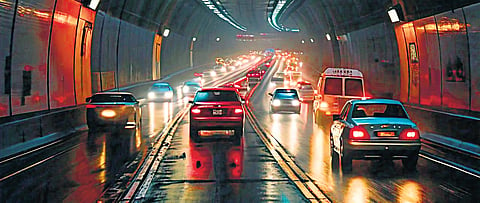

BENGALURU: The ambitious 191-km-long underground tunnel road network project, aiming to link 11 high-density corridors, may be perceived as a super solution to decongest the city’s roads. But experts have already warned that the project threatens adverse impacts arising out of geological complexities with hard rocks and fissures, making tunnelling difficult and expensive; poses a threat to existing structures near the project line and the tunnel structural integrity in itself is in question as the soil is prone to settlement and instability; and raises environmental concerns. Besides, experts have also raised concerns over sinkholes and landslides increasing.
Now, although the state cabinet on August 22 gave its administrative approval to the first phase of the project — the Rs 12,690 crore 18.5-km-long tunnel road linking Hebbal with Central Silk Board junction — experts have warned that the project, if implemented, could trigger a major water crisis for Bengaluru, with the massive underground project acting as a water divider or dyke.
Dr GS Srinivasa Reddy, former director of the Karnataka State Natural Disaster Monitoring Centre (KSNDMC), said the project may create dykes and the city will lose free flow of underground water, aggravating water scarcity in the city.
“Not just along the proposed tunnel road, drilling of borewells is not allowed even along the Metro line. Even the chance of using underground water along these projects in future will not be possible. The existing borewells also will be removed as they may pose a danger to the project. The water stored in dykes will change the flow of underground water or completely stop it,” he said.
In the city, nearly 5,000 borewells with civic agencies have completely gone dry. With the tunnel road project, many more borewells could go dry. Over one lakh borewells have been drilled across Bengaluru in the last ten years by residents and apartment complexes, water experts said.
At present, the drinking water needs of the 1.3 crore population of Bengaluru is fulfilled by the Bangalore Water Supply and Sewerage Board (BWSSB). The Board supplies 1,450 million litres per day (MLD) from the Cauvery river and with Cauvery Stage V, the Board will supply an additional 775 MLD. This apart, the Bruhat Bengaluru Mahanagara Palike has 14,781 borewells and BWSSB 11,816 to take care of drinking water needs of areas that have no Cauvery connection or on the outskirts.
Dr Inayathulla M, Director, Water Institute, University of Visvesvaraya College of Engineering (UVCE), said the proposed tunnel road project starting near Esteem Mall is a concern as Hebbal, where it is located, is a watershed area. “Water from Hebbal Valley flows to Jakkur Lake, Nagavara Lake and other water bodies.
If the upper valley fills up, the lakes downstream will also fill up. For any project, the feasibility study, hydrology, hydrogeology and traffic study are important. Unfortunately, in any Detailed Project Report, the least attention paid is to hydrology and hydrogeology studies. I hope the government considers this important aspect before taking up the project,” he said.
He cited the embarrassing example of floods in Delhi during the G-20 Summit, and the flooding of the New Parliament building because of low importance given to such studies.
Former State Planning Commission member BV Anand, appreciating Deputy Chief Minister DK Shivakumar’s ambitious vision of the underground tunnel road, questioned whether any feasibility study was conducted before the cabinet gave its administrative approval.
Raising issues of concern, Anand said, “The minister should have a strong political will to expedite the preparation of the Master Plan within a year for Bengaluru that has been pending for nine years. Development control is the key to the success of any city.”
He reminded the state government about the ‘Northern Sector Peripheral road’ (Tumakuru Road-Devanahalli Road-Hosur Road) proposed in the 1995 Master plan. “Clear the encroachments that have blocked the proposed roads of the 2015 Masterplan. Prepare an inner city rejuvenation plans for areas like Chickpet (Avenue Road-KR Market), Shivajinagar, Ghori Palya, etc, and prepare and implement plans to integrate roads emerging from 519 urban villages (that have been engulfed due to Bengaluru’s massive expansion) with the arterial roads,” he said.